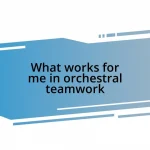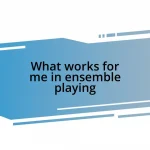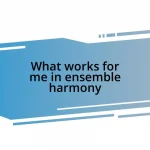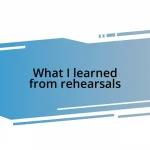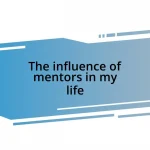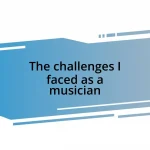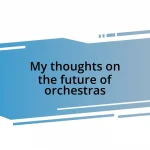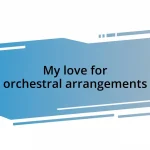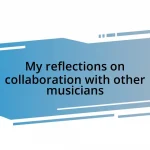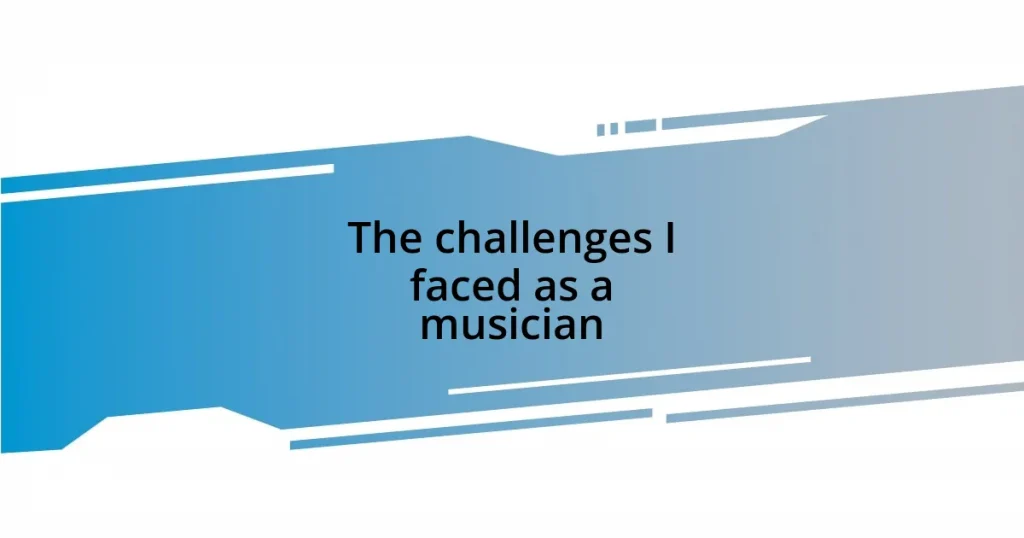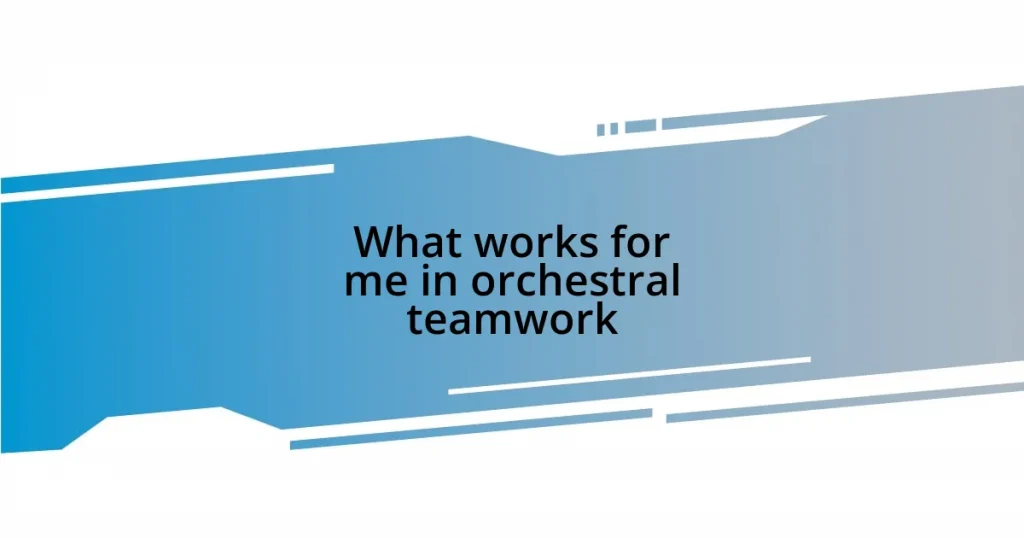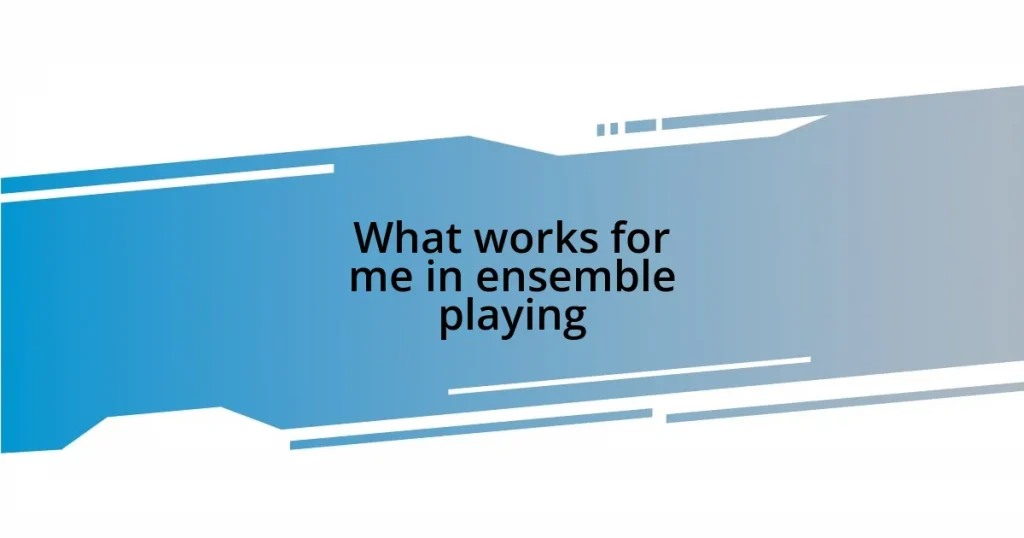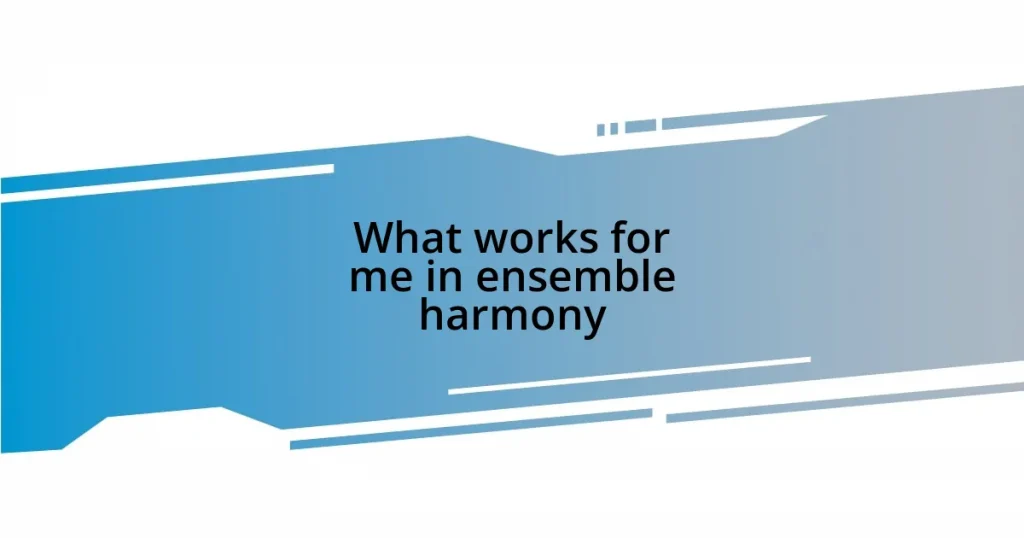Key takeaways:
- The musician’s journey is marked by moments of doubt, self-reflection, and resilience, which help shape artistic identity.
- Common obstacles for emerging musicians include financial instability, limited resources, and self-doubt, highlighting the need for support and a unique voice.
- Balancing passion and practicality is essential; setting achievable goals and breaking tasks into smaller chunks can aid in maintaining creativity amidst responsibilities.
- Building a support system and practicing self-reflection after performances fosters resilience and personal growth in the competitive music landscape.

Understanding the musician’s journey
The journey of a musician is often winding and unpredictable. I remember feeling overwhelmed during my first live performance—my hands trembled so much that I could barely hold my guitar. It made me realize that every musician faces moments of doubt and fear, but it’s those very experiences that shape us.
Every note played, every mistake made, adds a layer to our artistic identity. There were times I felt like giving up after countless hours of practicing the same song, wondering if my passion was enough. Have you ever questioned your own commitment? For me, it was those struggles and moments of self-reflection that rekindled my desire to create and pushed me further into my music.
The expectations we place on ourselves can be heavy. I once spent months crafting a song, pouring my heart into it, only to receive lukewarm feedback. It stung, but rather than letting it defeat me, I learned to value constructive criticism and stay true to my vision. Each setback, I found, is a step toward growth, making the path of a musician not just a journey of notes and rhythms, but of resilience and self-discovery.
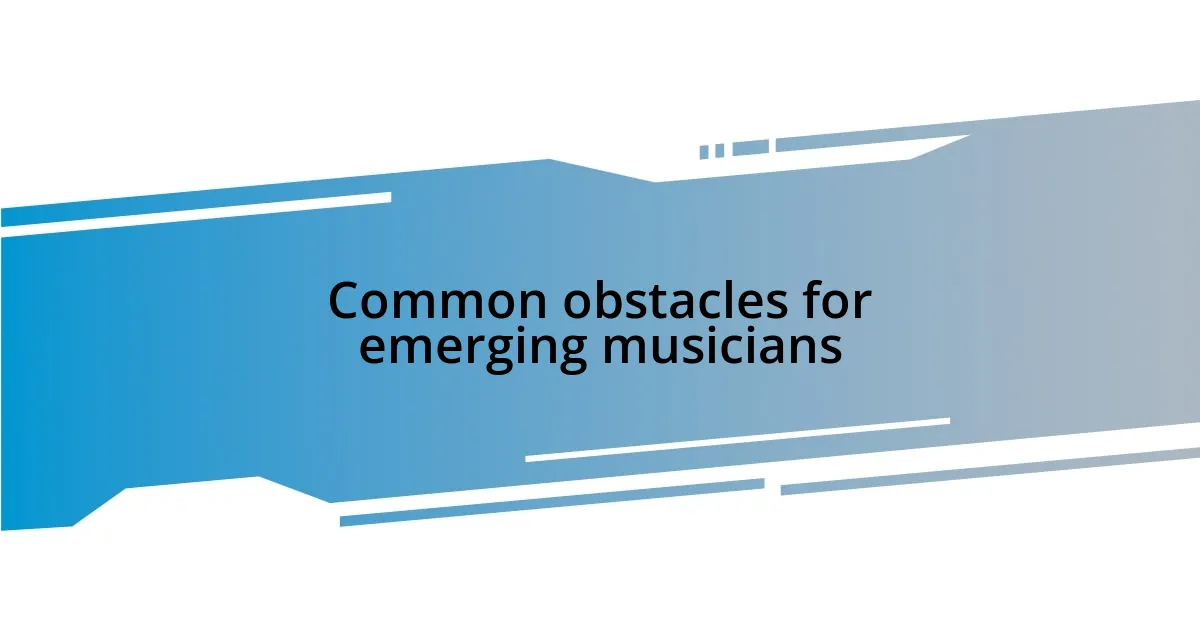
Common obstacles for emerging musicians
Stepping into the music scene is often met with a harsh dose of reality. One of the biggest hurdles I encountered was the challenge of standing out in a sea of talent. I recall an open mic night where so many incredible performers took the stage, each one better than the last. In that moment, I felt insignificant, questioning if anyone would ever notice my music. It’s easy to feel swallowed up by competition, but it’s crucial to embrace your unique voice and stay dedicated to honing your craft.
Emerging musicians also grapple with inconsistent income. When I first began booking gigs, I remember thinking I’d hit the jackpot with a weekend performance—only to find my earnings barely covered my gas and dinner. Here are a few common obstacles that many musicians face:
- Financial instability: Juggling day jobs while pursuing music can be draining and demotivating.
- Limited access to resources: Not everyone has the luxury of top-notch instruments or professional studio time.
- Networking difficulties: Building connections in the industry often feels daunting, especially for introverted musicians like me.
- Self-doubt and mental health struggles: The pressure to succeed can lead to burnout and insecurity about one’s talent and vision.
- Balancing creativity and commercialism: There’s often a tug-of-war between artistic expression and the need to appeal to a wider audience.
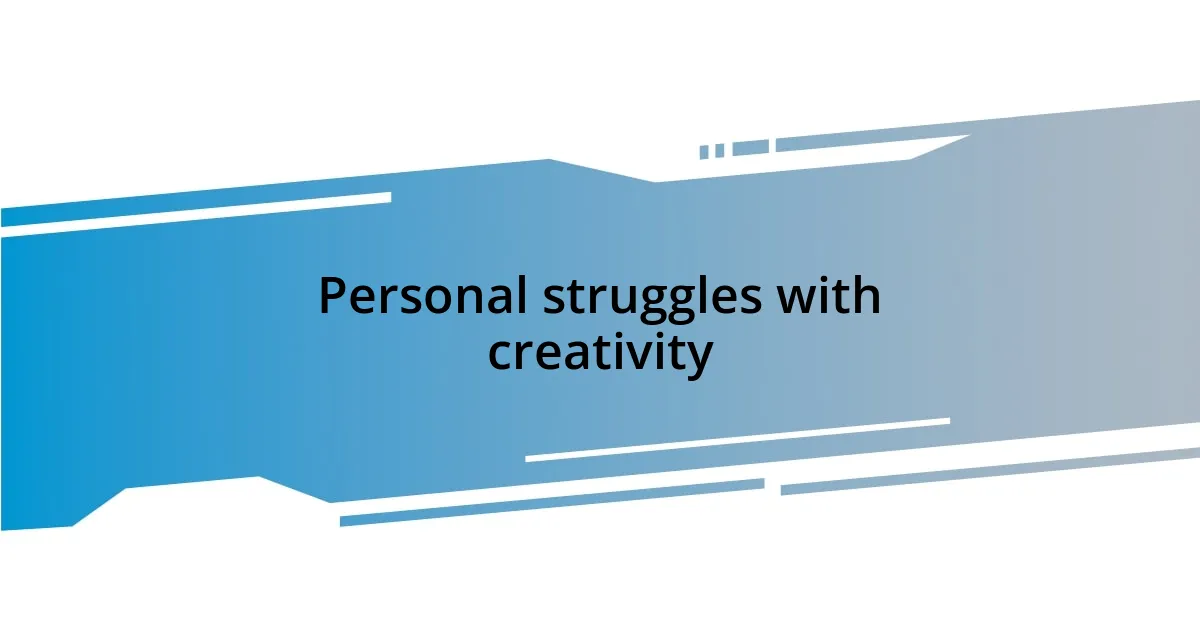
Personal struggles with creativity
Creating music is not just about hitting the right notes; it’s about expressing emotions and weaving personal stories into every song. I have faced moments of complete creative block where no ideas seemed to flow and my guitar felt more like a burden than a tool for expression. During these times, I often turned to writing poetry or journaling, allowing myself to explore emotions that didn’t seem to fit within a melody. Have you ever felt the weight of silence in your own creative endeavors?
In contrast, there are days when inspiration strikes like a thunderstorm—I remember one such evening, strumming the chords that came to me out of nowhere and capturing the essence of an experience I had almost forgotten. That rush of creativity can be exhilarating, but it also sets up a paradox of expectation: how do I recreate that magic again? I find myself caught in a cycle where I chase those fleeting moments, sometimes leading to disappointment when the next attempt feels lackluster. The question always lingers: why can creativity feel so elusive?
I’ve also recognized how environmental factors can impact my creative flow. A cluttered space often mirrors a cluttered mind; when I tidy up my surroundings, I feel a sense of clarity. I once rearranged my music corner, and the change sparked a rush of new ideas. It’s fascinating how simple shifts can influence our creativity. I encourage you to take a moment to reflect on your surroundings—how might they be affecting your creative process?
| Creative Struggles | My Experiences |
|---|---|
| Creative Block | Struggling for ideas, eventually writing poetry to break free |
| Inspiration Rush | Fleeting moments that lead to high expectations for future creativity |
| Environmental Influence | Clutter affected my mind until I reorganized my space |
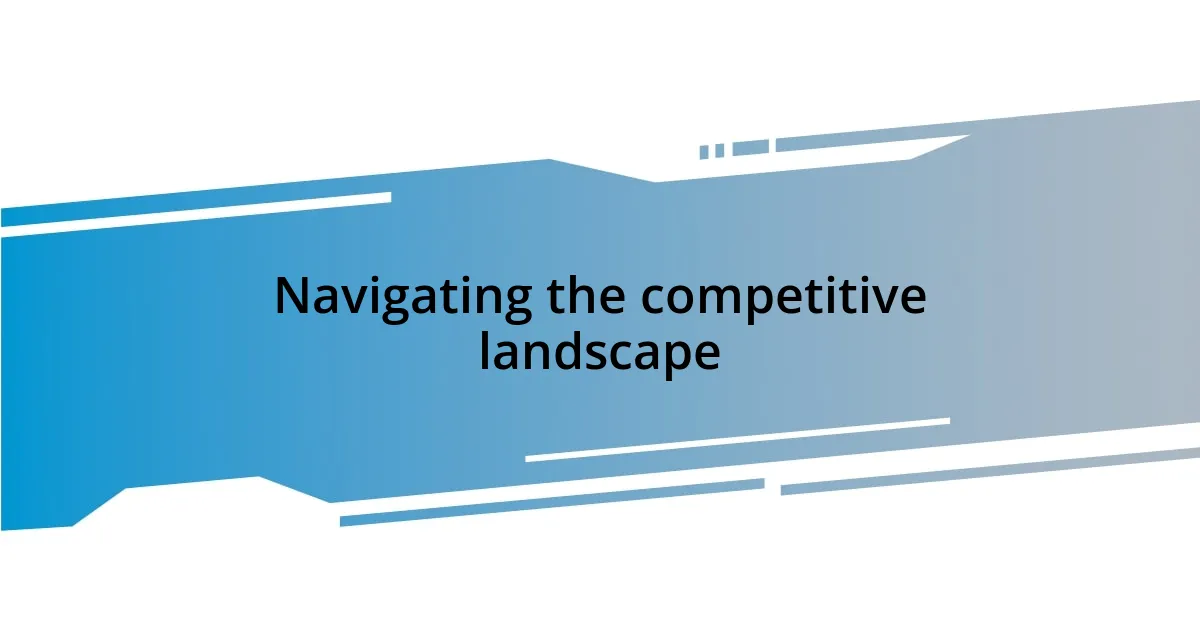
Navigating the competitive landscape
When it comes to navigating the competitive landscape as a musician, I often find myself reflecting on the importance of resilience. There was a time when I entered a talent competition, thinking I had a unique sound that would set me apart. I poured my heart into the performance, only to look around and realize many others were doing the same, some with impressive flair. Instead of letting that discourage me, it pushed me to dig deeper into my artistry. Have you ever felt that urgency to improve just to keep up?
The pressure to network can be overwhelming. I remember driving for hours to a music conference, feeling a mix of excitement and anxiety. It was a room full of artists just as eager, just as talented. Approaching others felt like a game of chance; would they embrace me or leave me hanging? I found that starting with genuine compliments on their work opened up conversations more than any rehearsed pitch ever could. Have you experienced that initial hesitation before striking up a conversation?
Over time, I learned that collaboration can transform the competitive atmosphere into a supportive community. I once joined forces with a fellow musician to write a song together. Initially, I worried about my contributions being overshadowed or deemed inferior. Instead, our ideas melded beautifully, and the track we created became a testament to how collaboration can be far more powerful than competition. Have you considered how working together with others can ignite your own creative fire?
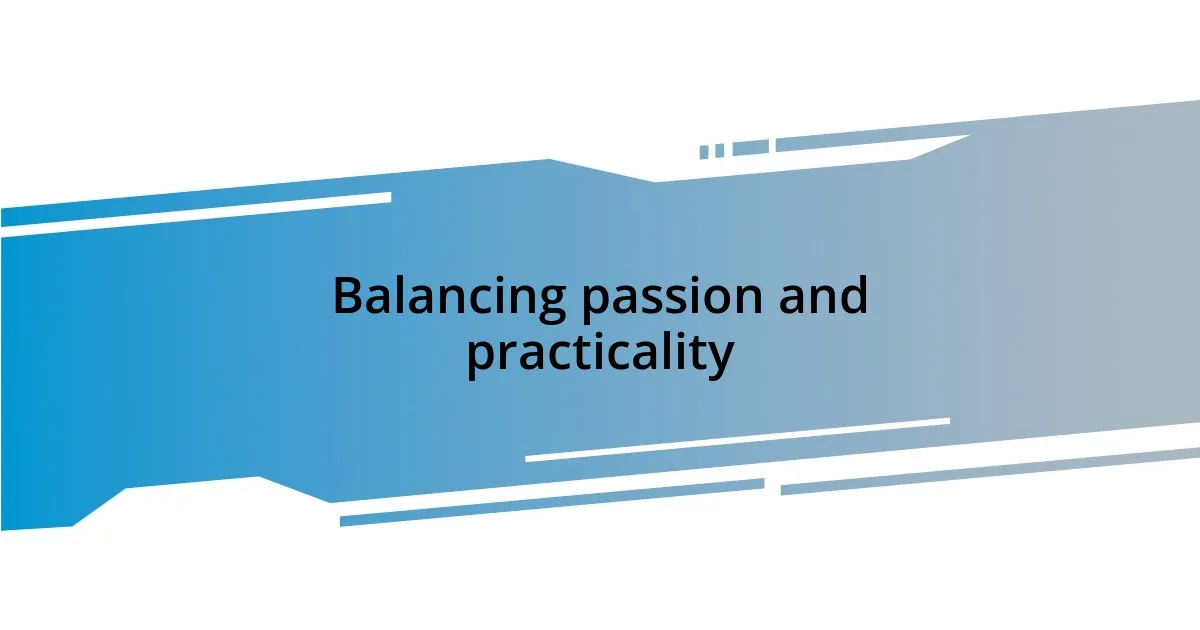
Balancing passion and practicality
Finding the right balance between passion and practicality is often a tightrope walk for musicians. I vividly recall the time I had to choose between chasing a gig that sparked my creativity or taking a stable job to pay the bills. It felt like a tug-of-war between my heart and my head—was I willing to sacrifice a steady income for the chance to make music that truly resonated with me? That decision made me question how I could pursue my passion without compromising my financial security.
There are days when I wake up filled with inspiration, ready to create, but real life pulls me in different directions. I remember one weekend when a burst of ideas flooded my mind, yet I was also faced with laundry, groceries, and a growing pile of responsibilities. I often ask myself: How can I carve out time for my music amidst daily demands? I’ve found that breaking my creative tasks into smaller chunks helps. Just 15 minutes of strumming can reignite my passion and help me feel more balanced.
Ultimately, I’ve learned to intertwine my passion for music with practical steps to ensure sustainability. For instance, I started planning monthly budget sessions where I sketch out my music-related expenses alongside my regular bills. This approach not only eases my financial anxiety but also allows me to allocate time for writing and composing without feeling guilty. Have you tried structuring your creative pursuits around your life’s demands? It’s a game-changer.
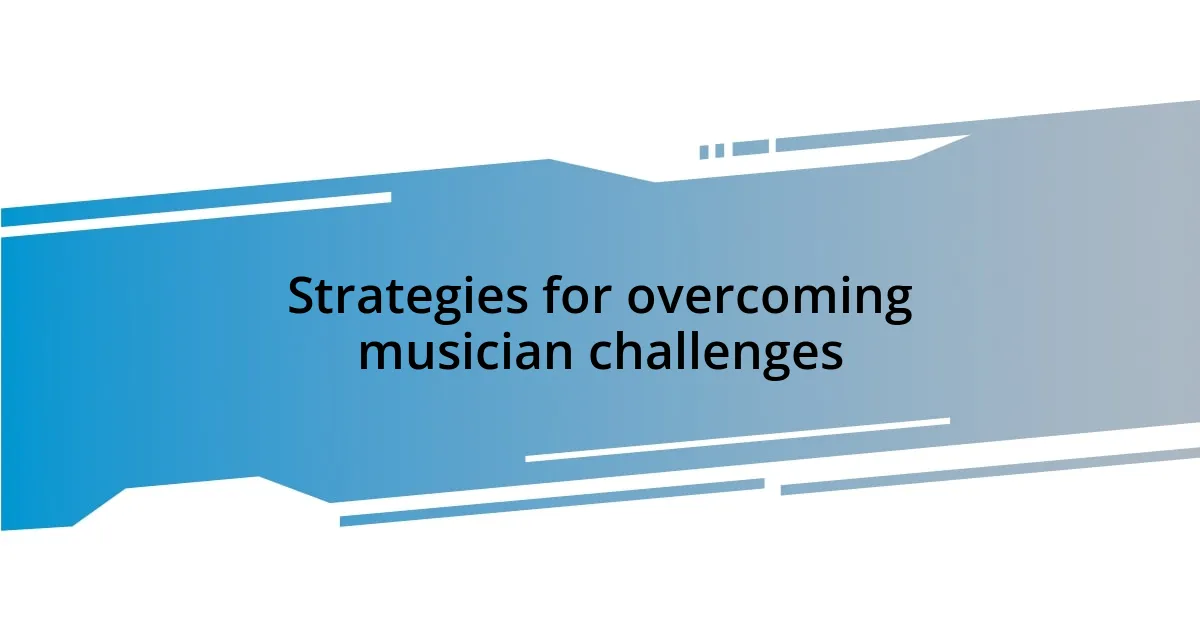
Strategies for overcoming musician challenges
Building a support system is crucial for any musician facing challenges. I remember reaching out to a group of local artists to form a small meet-up. Sharing our highs and lows really created a sense of camaraderie. Have you ever thought about how powerful it can be to connect with those who truly understand your journey? Those gatherings became a safe space where we could share practical tips and emotional support, reminding me that I wasn’t alone in this unpredictable industry.
One effective strategy I’ve embraced is setting achievable, specific goals. For instance, instead of just saying I wanted to perform more, I committed to booking one open mic night each month. That sense of accountability kept me motivated and focused, making the idea of stepping on stage a brick-building experience rather than a daunting wall. Can you recall a moment when a small goal significantly boosted your confidence? Achieving these incremental goals has undoubtedly shaped my path, helping me overcome the paralyzing fear of failure.
Finally, I’ve discovered the importance of self-reflection. After each performance or project, I take a moment to journal about what went well and what I want to improve. This practice has helped me process my experiences and transform them into actionable insights. How often do we pause to reflect on our journeys? By recognizing patterns and celebrating progress, I cultivate resilience, turning setbacks into stepping stones for future success.

